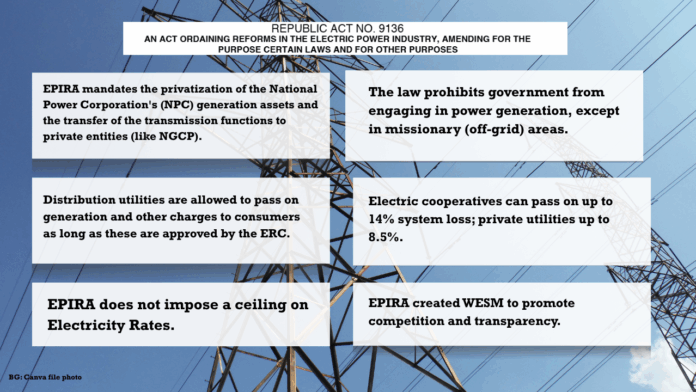One thing we learned in our recent series on the Philippine energy sector is the simple fact that there is a piece of legislation we can trace almost everything back to.
Republic Act 9136, or more commonly known as the Electric Power Industry Reform Act (EPIRA) of 2001, is the law that governs how energy is created, distributed, and ultimately priced across the Philippines. And with the constant shocks the world has been experiencing in rising fuel costs, it is the Filipino people who bear the brunt, feeling the steady increase in their monthly bills.
In 2025 alone, consumers across the country felt a volatile rise of up to 5.5% in electricity rates, with household bills increasing by as much as ₱128 per month despite some temporary rollbacks.
For its part, the Department of Energy (DOE) is aware of the law’s shortcomings. In 2023, it held a series of consultations with various groups, including electric cooperatives, utilities, business chambers, local government units, and consumer organizations, to gather input on how EPIRA should be changed.
Across these consultations, clear trends and similarities emerged in what many wanted to change with EPIRA.
Among these proposed reforms are the increased availability of Prepaid Retail Electric Service (PRES), or loadable electricity. There is also the simplification of lifeline rate systems or payment assistance, the prevention of companies from inflating costs, and the prevention of monopolies.
Strengthening of government oversight, such as giving agencies like the DOE and the Energy Regulatory Commission (ERC) mandatory audit powers, the authority to impose stiffer fines, and stronger enforcement capabilities to ensure that energy companies are held accountable and can be penalized or corrected when necessary.
Another major reform item is the faster rollout of what is called “open-access.” This means allowing consumers to choose from multiple power suppliers, first for large-scale users like industrial and commercial consumers, with the long-term goal of making this option available to residential consumers as well.
Even President Ferdinand R. Marcos Jr. has urged Congress to review and consider amending the more than two-decade-old law during his third State of the Nation Address in July 2024.
So now the question remains: when will our legislature act on this call to action and ensure that the Filipino public is not unnecessarily burdened with increasingly large monthly power bills?



